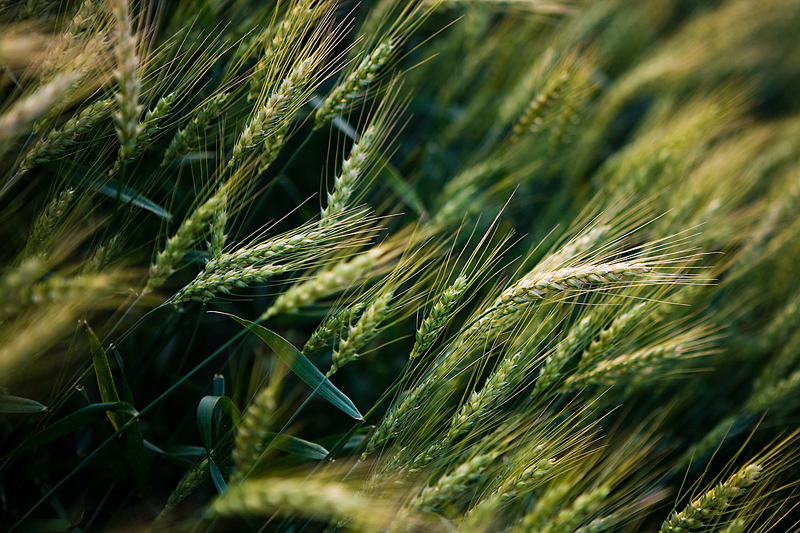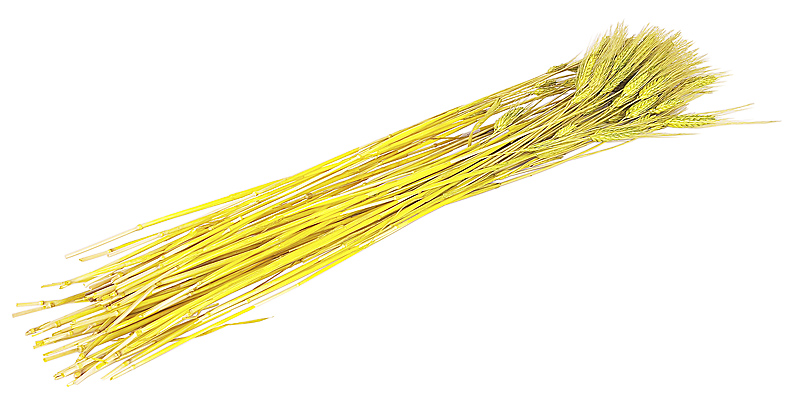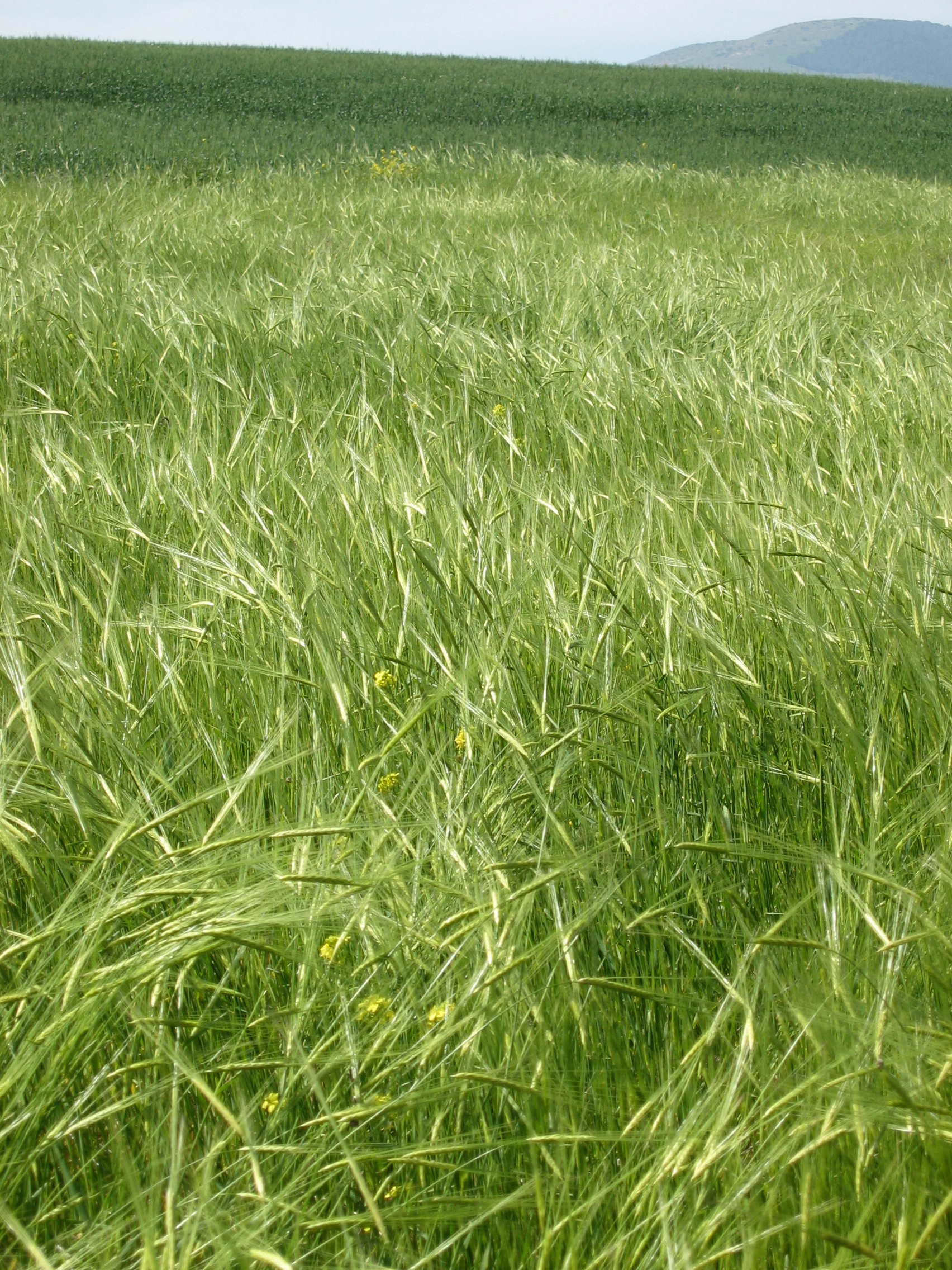
Quite often at the beginning of the biblical new year there is confusion as to whether the barley in the land of Israel is aviv (or abib) or not. After searching the land of Israel for aviv barley in the early spring, some search groups declare the barley to be aviv and some do not, even though both groups look at the same barley. Why the confusion, and who is right? Eventually each person has to make up their own mind, but below we will explain the criteria for determining whether the barley is aviv or not.
At this point, some of who are reading this may be saying, “Huh?” when it comes to the term aviv barley. What is aviv barley and what does that have to do with anything that pertains to me? To answer this question, let’s quickly review some basic truths regarding the biblical calendar. This is important to know if we want to celebrate YHVH’s biblical feasts at the right time and according to his Torah-instructions.
The first fundamental truth to understand in determining when to observe the biblical holidays is that months on the biblical calendar begin when the new moon is sighted. (I’ve already discussed this issue elsewhere. For that info, go to http://www.hoshanarabbah.org/teaching.html#feast.) To know the dates of the biblical feasts, one must determine when the months begin, and this is dependent on knowing when the biblical new year begins—that is, figuring out when is the first day of the first month of the biblical new year.
On our modern Roman calendar, determining new year’s day each year easy to do. But this is not the case with the biblical calendar. Why is this? The Roman calendar is based on the solar cycle, which is 3651/4 days long. By contrast, the biblical calendar is a luni-solar calendar. This means it’s based on both the solar cycle and the lunar cycle. The latter is only 354 days long, or roughly 11 days shorter than the solar cycle. The biblical feast go off the lunar cycle, not the solar cycle and is based on knowing when each month begins. This means that if you base your year only on the lunar cycle, then each lunar year will fall behind the solar cycle 11 days each year. In three years, that will be 33 days or a little more than a month. That being the case, eventually, the biblical feasts will fall further and further behind the solar calendar and the seasons. Were this to occur, then in three years we would be celebrating Passover a month earlier, or in the winter and not in the spring. In a number of years, Passover would occur in December, then in the autumn, and then in the summer, and in a few decades, we would be back in the spring again. This cannot be so, since the Torah declares that the feasts must fall “in their seasons” (KJV) or “at their appointed times” (NKJV) (Lev 23:4). Thus they cannot fall outside their appointed seasons. There are deep spiritual or theologically reasons for this, but we will save that for another discussion.
Because the lunar calendar is 11 days shorter than the solar calendar, roughly at the end of every third year going into fourth year on average the lunar calendar needs to make an adjustment to stay in sync with the solar calendar. This means that one must add a thirteenth month (in Hebrew called Adar Bet) to the calendar in order to keep up with or to stay aligned with the solar year. This is called a leap year, or, technically, an intercalary year. It is the same idea of adding an extra day onto the month of February every four years on our modern calendar.
Now how do we know when to add a thirteenth month? Well, the Bible doesn’t just spell it out in Greek-thinking logic like a mathematical equation. As with most biblical subjects that reflect Hebrew block or step logic, we have to search the Scriptures for the answers and then put the pieces of the puzzle together. The same is true when figuring out issues pertaining to the biblical calendar including when the new year begins and when to add a thirteenth month.
We won’t go into much detail here, since this is a brief overview of the subject. (Again, for the details, see the link to my articles on the biblical calendar at http://www.hoshanarabbah.org/teaching.html#feast.) Suffice it to say, the ancient (now wild-growing) barley in the land of Israel is the factor that determines whether to add a thirteenth month or not. In fact, the first month of the biblical calendar is called the “month of the aviv” (or abib, see Exod 13:4; 23:15), which is a technical agricultural term relating to the state of maturation the barley grain in the early spring season of the new year.
Barley is the first grain crop ripen in the land of Israel in the early spring, and typically comes ripe roughly 50 days before the wheat harvest in the late spring during the time of the biblical Feast of Weeks or Pentecost.
For the first month of the biblical calendar to be called “the month of the aviv,” the barley must be in the aviv state of maturation. This means that the barley grain is “green in the ear” and is at the least parchable, that is, it can be roasted over a fire to make it grindable. Why is this important? It is to be able to fulfill the biblical command to offer up to YHVH an omer of grain (roughly an amount equivalent two-litters) on First Fruits Day during the Feast of Unleavened Bread season. The spiritual and prophetic importance of this day is yet another discussion which I cover elsewhere (https://www.hoshanarabbah.org/pdfs/unlbread.pdf and https://www.hoshanarabbah.org/pdfs/firstfruits.pdf). Suffice it to say, it prophetically points to Yeshua the Messiah’s ascension to heaven after his resurrection.
So in the biblical calendar, if we come to the end of the twelfth month, it is necessary to go searching through the land of Israel for aviv barley. If you find it in sufficient quantities (at least 32 omers), then this marks the beginning of the first month of the new year. If you don’t find it in sufficient quantities, then you add a thirteenth month onto the end of the current year (again referred to as Adar Bet). Again, roughly at the end of every third year, a thirteenth month must be added to the biblical calendar to keep the lunar calendar (which the biblical feasts are based on) in sync with the solar calendar (which the biblical year is based on).

If one finds aviv barley, how much aviv barley is enough? There must be enough to make a sheaf or an omer’s worth of grain, which is a biblical measuring unit equal to about two liters. Why this amount? This is because the Torah commanded the priests to offer up an omer of barley grain on the First Fruits Day (called the omer or first fruits offering) in conjunction with the time of Feast of Unleavened Bread that falls during the second half of the first month of biblical calendar (Lev 23:9–14). So finding a few stalks of aviv barley in a field is not sufficient. There must be enough to make two liters worth of flour.
Now at this point in the discussion some well-meaning, Torah-pursuant people will disagree about the need to find a full omer-amount of barley on the first day of the new month. Say, for example, you find only a few stalks of aviv barley, but not enough to make an omer, won’t there be enough barley that will have ripened within two to three weeks to make an omer for the first fruits offering on First Fruits Day? Maybe, but we cannot predict this for certain. It is mere speculation to say that the barley will have ripened from the first day of the month until roughly two or more weeks later when First Fruits Day occur. Why is this? Those who say yes are speculating that weather conditions will be such that there will be enough aviv barley to make an omer offering in time for First Fruits Day. But what if the weather suddenly turns cold, or cloudy and the barley doesn’t ripen in time after you have declared the new year? What then? What if you have declared the new year based on finding only a few stalks of aviv barley, but not enough to make an omer and all Israel is now preparing to keep the Passover and the Feast of Unleavened Bread? In biblical times, during this time each family would have been separating out their Passover lamb on the tenth day of the first month in preparation for slaughtering it on the fourteenth day on Passover as the Torah commands. Moreover, the Israelites would have been making plans to travel to Jerusalem or wherever YHVH had chosen to place his name in Israel in order to keep the Passover and Unleavened Bread as the Torah mandates. What happened if, after all of this, it is suddenly discovered that there was not sufficient barley for an omer offering because the weather conditions in the land of Israel weren’t conducive for the barley to ripen? You would have just thrown the whole nation of Israel into chaos. Thousands of lambs that were separated for the Passover sacrifice now have to be put back into the flock and travel plans have to be postponed for a month. All the temple preparations have to be put on hold, and all the plans that the priests and Levites have made as they were preparing to officiate at the spring feasts now have suspended for another month. The thousands of lambs that were brought to Jerusalem and sold by merchants to the Jewish pilgrims who were coming there to celebrate the feast now have to be returned to their pastures or stalled and fed for an extra month. Moreover, in ancient times people traveled by foot, and it took many days to get somewhere and provisions had to be stored up and then transported, so postponing a trip wasn’t easy to do. Though these issues aren’t factors for modern man, they were issues when the Tanakh (Old Testament) was written, and this is the cultural context in which we are to understand the Torah’s commands. If we try to understand and apply scriptural truths outside of this context, we run the risk of coming up with a false hermeneutic and we can end up twisting the Scriptures anyway we want to make it say whatever we want. This is not good! Those who do this risk becoming false teachers, which is a serious sin biblically. It is this wrong approach to interpreting Scripture that has led the mainstream Christian church (as well as modern rabbinic Judaism) to the place it is today with all of its unbiblical and manmade doctrines and traditions that often make of none effect the word of Elohim. This is something we are trying to get away from. We don’t want to leave behind the lies of the church (and rabbinic Judaism) in pursuit of biblical truth only to create our own unbiblical lies and traditions!
For these reasons, we have chosen the more cautious, less speculative approach that involves finding sufficient aviv barley in the land of Israel as done in ancient times to make an omer by the first of the month, rather than speculating what might or might not occur visà-vis the barley crop in two or three weeks.
As more and more of YHVH’s people are returning to the ancient paths and biblical Truth of YHVH’s Torah, they are wanting to follow the biblical calendar instead of unbiblical manmade calendars such as the current calendar of rabbinic Judaism that dates to A.D. 360 and was approved by Roman Emperor Constantine. This means that many people are now going out and searching for barley in the land of Israel. This is good. However, as with everything, there are differing opinions on a lot of issues.
Who is right?
That’s up to you to decide.
For the reasons stated above, we have chosen to take a more cautious and less speculative approach that involves finding sufficient quantities of aviv barley at the start of the new near and well before the omer offering was to be made on First Fruits Day. Other people will take the more speculative and risky approach and predict ahead of time that there will be an omer’s worth of barley somewhere in the land of Israel in time for the omer offering. And they may be right. But who knows for sure if the grain will be ripe until it happens? What if it doesn’t happen after they have already declared the new year? Then what? This is confusion, and YHVH is not the author of confusion (1 Cor 14:33)!
If there is sufficient quantities of aviv barley by the first day of the year, then it logically follows that there will be sufficient quantities by First Fruits Day. By taking this approach, we believe that we are on more solid ground logically and biblically.
Both sides of the issues have their valid arguments, but we have chosen the more cautious approach over the more speculative one.

One more point needs to be made. The Torah mandates that one cannot eat any barley from their crop until the First Fruits Day offering is made (Lev 23:14). What if a farmer’s field of barley came ripe before First Fruits Day? Could he harvest his crop as long as he didn’t eat of it until the omer offering was made? Yes. This is because there is no prohibition in the Torah from doing this. Some people may point to Deuteronomy 16:9 as such a prohibition to cutting one’s barley before First Fruits Day. Let’s look at this passage carefully.
You shall count seven weeks for yourself; begin to count the seven weeks from the time you begin to put the sickle to the grain.
Now let’s compare this passage to some more detailed instructions found earlier in the Torah and one which is more specific to First Fruits Day.
Speak to the children of Israel, and say to them: “When you come into the land which I give to you, and reap its harvest, then you shall bring a sheaf of the first fruits of your harvest to the priest. He shall wave the sheaf before YHVH, to be accepted on your behalf; on the day after the Sabbath the priest shall wave it. And you shall offer on that day, when you wave the sheaf, a male lamb of the first year, without blemish, as a burnt offering to YHVH.” (Lev 23:10–12)
In this passage, we find two actions occurring: reaping the barley harvest and subsequently bringing that harvest to the local priest who lived in the farmer’s own village or region. Nowhere does this verse say that the reaping of the grain and the day the priest must make the wave offering (on First Fruits Day) are on the same day. That is to say, if a farmer’s field of barley comes ripe earlier than First Fruits Day, he is not prohibited from reaping; he simply is prohibited from eating the barley before First Fruits Day (Lev 23:14). Therefore, since the Torah does not forbid it, the barley farmer has the Torah’s implicit permission to reap his crop before First Fruits Day (as long as he doesn’t eat any of it). This insures that he won’t lose his crop (i.e., the barley seed won’t fall to the ground), while he is waiting for the omer offering to be made on First Fruits Day.
Since the Leviticus 23:10–12 passage is the primary command pertaining to First Fruits Day and gives us more specific information and occurs prior to the Deuteronomy 16:9 passage, we believe our interpretation is the correct one in this case. This is because according to the basic rules of biblical interpretation (or hermeneutics), we are required to interpret a latter passage in light of an earlier passage and not vice versa. Therefore we do not consider the argument valid that one is prohibited from reaping their barley before First Fruits Day. They just are prohibited from eating their barley before First Fruits Day.
For these reasons, we are convinced that the barley must be aviv before and not after the first day of the new biblical year.




